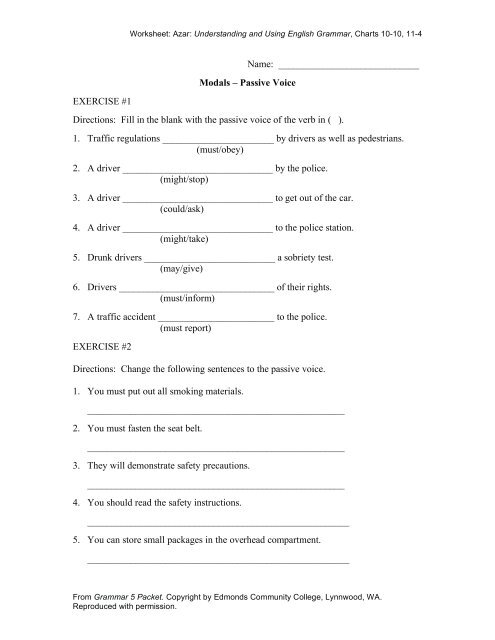
- THE PASSIVE OF MODAL VERBS EXERCISES HOW TO
- THE PASSIVE OF MODAL VERBS EXERCISES TV
- THE PASSIVE OF MODAL VERBS EXERCISES FREE
THE PASSIVE OF MODAL VERBS EXERCISES TV
'Were you allowed to watch TV at night when you were a child?' The students then go around their group finding out about what their classmates were and weren’t allowed to do and had to do when they were a child by asking questions with 'Were you allowed to.?' and 'Did you have to.?' Students put a tick or cross on the back of the card each time a classmate answers yes or no. Each student then prepares the question they need to ask, e.g. The students' task is to find out the answer to the question on their card by speaking to everybody in the group.

This activity can be used to practice permission, obligation and prohibition in the past.
THE PASSIVE OF MODAL VERBS EXERCISES FREE
In this free past modals of obligation and prohibition activity, students ask and answer questions about what they were and weren’t allowed to do and had to do when they were a child. The first student to reach the finish wins the game. Instead, they should use different answers or reform the sentence. If students land on the same square, they are not allowed to repeat a previous sentence made by another student. If the sentence is grammatically incorrect or doesn't make sense, the student must go back to their previous square. If the sentence is correct, the student stays on the square. The other group members listen to the student's sentence and judge whether it's correct or not. For example, if the square read 'Three things you mustn't do in class', the student might say 'You mustn't eat snacks, talk loudly or use your mobile phone in class'. When a student lands on a square, they make a sentence with the underlined language from the prompt, expressing past or present obligation, lack of obligation or prohibition.

Students take it in turns to roll the dice and move their counter along the board.
THE PASSIVE OF MODAL VERBS EXERCISES HOW TO
In this modals of obligation and prohibition board game, students review how to express past and present obligation, lack of obligation, and prohibition. The students then go around the class reading their sentences to other pairs who try to guess the place being described. Students must not say what the place is in their sentences. Afterwards, the pairs think of a place and write five rules for that place using modals of obligation.

The first pair to do this correctly wins. The students then read the sentences and decide which rules are for a museum and which are rules for a swimming pool, writing the sentence numbers accordingly. Next, students refer to the sentences they just wrote down and complete rules on the worksheet with the modals of obligation: must, mustn't, have to, don't have to, should or shouldn't. The students then swap roles for Text B and the process is repeated. This continues until all the sentences in Text A have been dictated. The reader runs to Text A, reads the first sentence, remembers it, runs back and dictates it to the writer who writes the sentence on the back of their worksheet. One student is the reader and the other is the writer. In this fun modals of obligation running dictation activity, students practice completing and writing rules for various places.


 0 kommentar(er)
0 kommentar(er)
